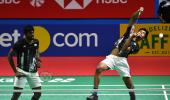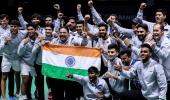'Badminton at this level is a mental game.'
'Often just one or two points makes the deficit and often it's upstairs on the first floor that these things happen.'

Mathias Boe must be delighted after his wards Chirag Shetty and Satwiksairaj Reddy followed up their Thomas Cup and Commonwealth Games gold medals with a milestone medal at the World Badminton Championships in Tokyo on Friday, August 26, 2022.
Boe, who joined as Indian men's double coach in April 2022, is attempting to make a change in how the Indian doubles players go about the sport by trying to introduce the 'Danish system'.
In the second part of an exclusive three-part interview with Rediff.com's Harish Kotian, Mathias Boe explains what he means by bringing the Danish system in Indian badminton and why he believes Chirag and Satwiksairaj can be the world's best doubles players.
Would you say the focus on doubles players is increasing in India? Is there a proper structure in place now as compared to a few years ago?
I am trying to structure it now. So that ways, my work is a bit different than what they have been used to.
I am bringing in that the Danish way of doing stuff. I am trying to give them a ray of ray of hope or a ray of light on what it takes, and that they also can like become champions, and that they can also become Olympic champions.
And it's not saying like Indians, they can only play singles. It's just because they haven't gotten the right focus and they haven't had maybe the proper guidance.
In badminton, it's five disciplines, and an Olympic medal is still an Olympic medal, no matter if it's men's singles, or if it's mixed doubles or doubles.
The great badminton nations, they have the ability to focus on all five disciplines. I think now that Satwik and Chirag are showing the way, it will be like that in the future.

You said you are trying to bring the Danish system in place in Indian badminton. What changes are you making to the current system of doubles badminton?
I see the way of how the practice is now it's a little bit more the Southeast Asian way. There have been a lot of southeast Asian coaches, Indonesians, Malaysian coaches who have been here for the last 10 years. They have a little bit of a different approach to it that we do in Denmark.
I put quality over quantity. If we have an intense training session, that is about two-and-a -half hours, you are really tired afterwards, both mentally and physically. So I would rather go with high intensity and less time to try and see if I can get the players to stay focussed.
For me, it goes without saying that, in average, a badminton match is 45 minutes, if I can stay focused for 45 minutes, that gives me the best chance of winning.
There is no point in me being able to play for three hours because so far a badminton match has never been three hours.
So rather than having a training session that is three hours long, where you just take in between take 10 minutes break and do nothing you can actually just practice for 45 minutes without even making a single error because that is what you were trying to achieve.
So that's the culture, that is how I am putting in the exercises and the sessions. I have two rules that they have to leave everything out there when they when they are there and they have to show up on time. That's the two things.
It is okay to adjust. It's okay in the morning to say 'Coach, I'm tired today, I can only practice one hour or 45 minutes or something because I am really so here or have a bit pain there.' That is okay for me, but when we are on court, we are close to as competition level as possible, by which I mean intensity, where we are between 95 and 100 throughout the entire session.
Then it is fine only to practice one day for 45 minute because as I said that is only required when we play a match. So that thought process it is something that I am trying to implement.
Does this Thomas Cup win also give India hopes of winning a few medals at the Paris Olympics two years down the line?
Paris is two years away, a lot of things can happen in two years. Of course it's good to have the ambitions of winning a gold that's why I am hired obviously but right now, there is also other things just in the near future that we are focusing on.
Satwik and Chirag should lead the way, they should also be an inspiration to the remaining doubles pairs in India. As we talked about before, that it's actually possible that an Indian can become the best doubles player in the world.
You have seen with Gaya (Gayatri Gopichand) and Treesa (Jolly) reaching the semifinals at the All England, you can see how much they have progressed in the last six months.
Maybe they can't continue with this kind of form but if they can improve around 5-7 percent over the next year or so, then maybe it's possible for them to challenge at the Olympics.
Right now we are focusing on staying in the moment and push each other, each and every day at the sessions and that goes not only for Satwik-Chirag but it also goes for the other doubles teams.
The other doubles pairs should be hungry to try and catch up with with Satwik and Chirag. They have the fortune to practice with them so they can see what level and have someone to be measured up against all the time.

Chirag Shetty and Satwiksairaj Rankireddy saved 4 match points in the second game in the Thomas Cup final, which proved to be the turning point as they went on to not only win the doubles match but it also demoralised Indonesia.
From a coach's point of view, what would you say made that amazing comeback possible?
I would say it was lucky. I mean, you have this situation they were down and out 19-15 down in the second game after losing the first. Most matches, no matter who you play against, even if you play against lesser skilled opponents, to come back from 19-15, you are not the favourites.
It's not like they just changed one thing, and then they just snapped it, you need luck also. What was defining in that game, was that they just kept staying in it. they kept believing in themselves. They kept doing the right things, especially towards the end.
They were just like 'Okay, we fight for each and every point and then we have to see what happens.' And if you do that instead of just throwing the match, if you are trying to fight for each and every point, you never know what happens.
Obviously, nine out of 10 times they would have lost a match but in this case, they fought for every point, didn't look at the situation like 'If we lose the next point we have lost', but just tried to stay as focused on each and every rally as possible.
And then all of a sudden, they took the second set, then it was a 50-50 match again. So, I can't say that it was just this thing or that, it was also a lot of luck involved. But the fact that they were managed to stay in it and just fight for each and every point that did it, so great effort!
Chirag and Satwiksairaj went down to Chinese Taipei in the group stages at the Thomas Cup. Was that a sort of a timely wake up call for them?
No, I don't think so. But also in that match, they had the chance in the second set. Lee Yang and Wang Chi-Lin played a good match, they came back, they haven't been on tour this year so far so we didn't know what to expect.
But they played well, we got a little stressed in certain situations. But with these team events, if you can just like brush off that defeat, and just stay focused on the next match, then one defeat is not so important.
Maybe that is actually a good thing, because then you are even more focused, and even more ready. The players who can manage to brush that off, they often show great results later on in the tournament.
Even the best players, they sometimes lose a match in the team event, but come back strong and and win a few crucial matches. And we did this in the Thomas Cup.
You returned in April for your second stint as India's double coach. How did you turnn around the Indian doubles team in such a short span of time because Chirag and Satwiksairaj were losing a lot of close games?
It's a little bit about momentum, badminton at this level is a mental game. It is often just one or two points that makes the deficit and often it's upstairs on the first floor that these things happen.
So it's not like I went in and, and changed a lot of things because it doesn't require a lot of things. It is just like, you have a few things that you can do on crucial points that we know is working.
It is very important that we keep that we keep the game simple -- because when you get tired, you are even a little bit more nervous.
We talked about a plan, they can do. It's a little bit technical -- in 2 and 4 and 1 and 3 -- meaning when when I am receiving then I cover, that's the second stroke, and then I cover fourth stroke, or I play at this side, so my partner can cover for stroke.
It is a little bit like a game of chess. In badminton, you can't predict like, eight steps ahead, but you can mostly predict at least the first four, if not the first six steps.
If my opponent is serving, I am receiving there, then my opponent only has the option of playing there or there and then I can I can try and play there.
The first four strokes, it's quite easy to predict and I told them that it's extremely important that we don't just go out and play but we have a plan with what we are doing with the first four strokes.
That makes it a little bit more simple when you are nervous just like I know, I can do this stroke, so I am just going to do this stroke, and then my partner he will cover here, and then we get a good chance of scoring the points.
It's these little things, it is a bit technical, I know but it's these small things that we try to adjust and were not afraid of doing. If we would have done that and we would have lost that just means that our opponents are good at countering and then it's just credit for them to reading what our next move was.











